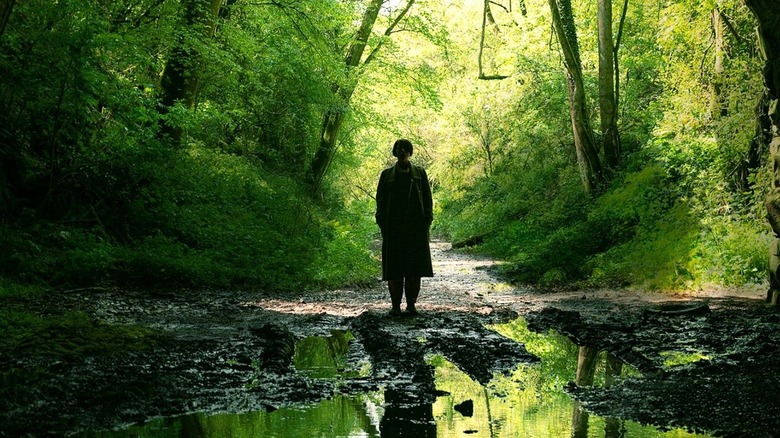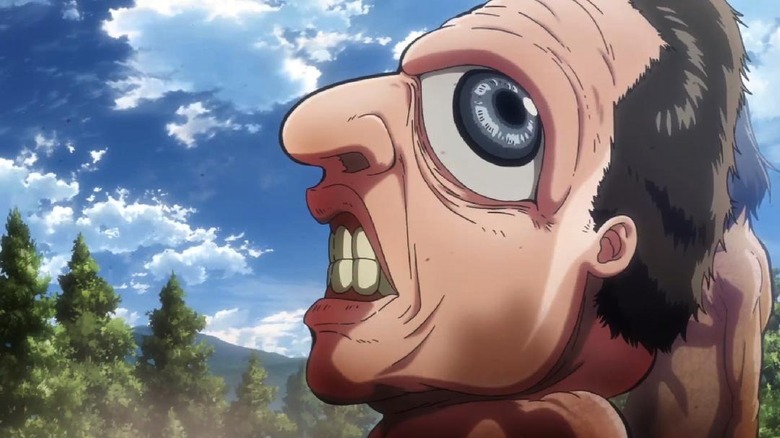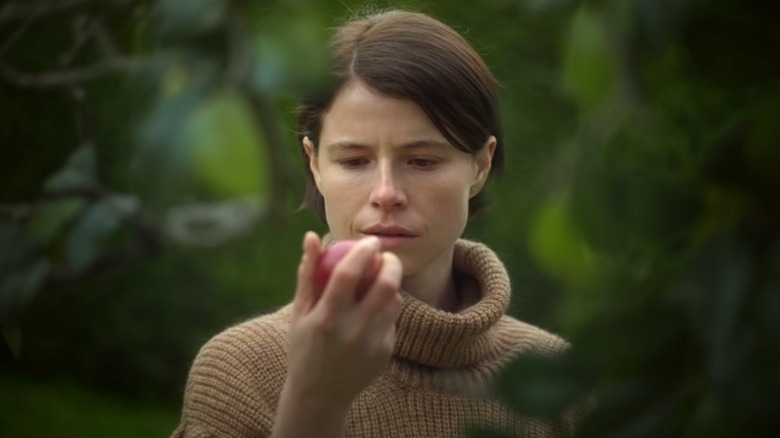How Attack On Titan Inspired Alex Garland To Change The Ending Of Men
"Ex Machina" director Alex Garland's newest film, "Men," had an unexpected source of inspiration. This will be the filmmaker's first venture into folk horror. As expected, the film pays tribute to staples of the genre like "Wicker Man" (1973). The terrifying conclusion of "Men," however, actually takes influence from an anime — the hit fantasy series "Attack on Titan."
"Men" follows Harper (Jessie Buckley), a woman who escapes to the English countryside for some peace of mind after her husband's death. Instead of relaxing, she feels a presence following her through the woods, even creeping into her subconscious in the form of nightmares. The film features a bone-chilling performance from Rory Kinnear ("Penny Dreadful") as various men in the village that Harper visits, including the owner of the house she rents. Through very subtle use of practical effects like false teeth, Kinnear's onscreen presence alone is made unsettling and uncanny.
This idea to find horror in slight changes to the human body first came to Garland when he was watching "Attack on Titan" with his daughter, the director said in a roundtable attended by /Film.
The Titans have a 'silliness' that Garland wanted to emulate
"Attack on Titan" is set in a fictional world where giant, man-eating, anthropomorphic monsters called Titans threaten the human race. When the Titans smash through the walls surrounding the city after a century of peace, soldiers like young Eren Jaeger (the show's protagonist) are called into action.
There are several types of Titans, the first ones introduced in the series being Pure Titans. These monsters have the brain capacity of infants and resemble enlarged humans with some exaggerated features. Other types of Titans, like the Armored Titan, are fully capable of strategic thought and movement and have distinctive physical features like sinewy and impenetrable skin.
Garland was drawn to the way that "Attack on Titan" manipulates human features with "quite subtle changes" to the point of "ridiculousness." Garland found the hilariously exaggerated features of the Titans' physical forms to be a joint source of humor and terror. He found "a funny kind of patheticness" and "silliness" in the Titans to be an incredibly important component of "Men" that would "sit alongside the horror and the strangeness."
Horror and humor rolled into one
Seeing "these two things [sitting] right up against each other" inspired Garland to rethink some of his own work. Using the anime as inspiration, Garland began to draw up sketches for the uncanny characters that would haunt the screen in "Men." This led to the development of the film's final sequence, which features a truly horrifying and truly silly contortion of the human form.
The horror genre is rife with camp and irony. Humor and horror sit at opposite ends of the emotional spectrum, making it the perfect foundation for jokes. Lots of modern horror directors have explored this relationship, like Jordan Peele's "Get Out" and Mimi Cave's "Fresh." Garland himself dipped a toe into this dichotomy in "Ex Machina," which features its fair share of laughs and frights. However, these two things are rarely derived from the same source. The use of the uncanny in "Men" will be a breakthrough for the genre that finds a perfect synthesis between silliness and scariness.


